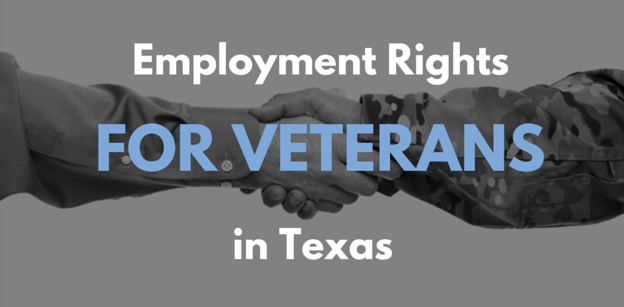A huge number of current and former members of the military reside and work in the State of Texas. As such, it is important for these individuals to understand their rights under both State and Federal law. Texas has enacted a State law which provides for veterans to receive preference in employment with a state agency. Federally, the Uniform Service Employment and Reemployment Rights Act (“USERRA”) protects past and present members of the uniformed services from discrimination in employment.
Veteran’s Employment Preference Act
The Texas Veteran’s Employment Preference Act is found in Chapter 657 of the Texas Government Code. Although relatively limited in terms of its impact on veterans’ ability to obtain employment with state agencies, it does theoretically provide certain employment rights for veterans in Texas and gives veterans an edge when applying for positions. The reason that I emphasize the limitations of the law is that it is very specific in terms of when a veteran should be given this preference. The only time that a veteran receives this preference is when he/she is compared to other applicants for the same position “who do not have a greater qualification.”
Without a whole lot of guidance from the Legislature, what constitutes “greater qualification” is subject to a good deal of interpretation. Does it just mean that the State agency must look at the objective criteria like education and work history? Or does the agency also consider more subjective elements of the application process like the interview? It would appear as though there would need to be two nearly identical candidates for the law to actually impact the hiring decision. As written, the Texas Veteran’s Preference Act does not really have the impact that the Legislature likely intended when it was enacted.
Discrimination under USERRA
Veterans, and current members of the armed forces, enjoy much greater protections under USERRA than under Texas State law. USERRA
- prohibits discrimination and retaliation against past and present members of the military,
- ensures that you have the right to be reemployed if you are forced to leave your job to perform service
- allows members of the military the right to elect to continue their existing employer health plan for up to 24 months if they are forced to leave the job for service.
Like the anti-discrimination laws that prohibit discrimination based on an individual’s gender, race, age, disability, national origin, or color, USERRA prohibits employers from discriminating against an individual based on that individual’s past or present military service or intent to serve in the military. Not only are employers prohibited from using this information to deny someone employment opportunities, but it also cannot be used for purposes of re-employment, promotions, or any other benefit offered by the employer.
Employment Assistance for Veterans
In addition to the Veteran’s Employment Preference Act and USERRA, Veterans also have various tools available through both the VA and other state and federal organizations. For example, the Texas Workforce Commission gives priority service for veterans searching for jobs through its Workforce Solutions offices. Additionally, the Veterans’ Employment and Training Service (VETS), which is part of the United States Department of Labor, provides assistance to veterans entering or re-entering the workforce.
If you are a current or former member of the military and you believe that your status as a veteran or current member of the military is being held against you in some way by your employer or a potential employer, it is important that you understand all of your legal rights. An employment attorney in your area can discuss your potential claim and provide you with your legal options.









